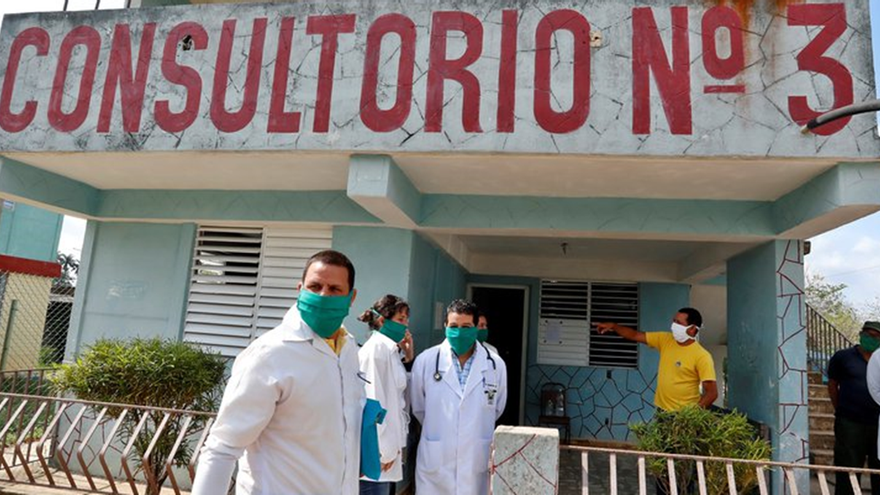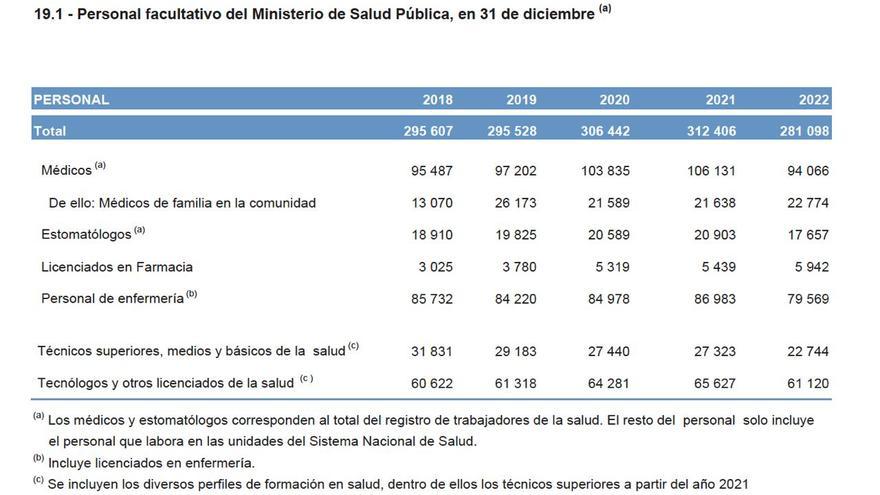
![]() 14ymedio, Madrid, August 10, 2023 — The crisis of the healthcare system in Cuba, palpable in hospitals and polyclinics, now has its correlation in official figures. According to the most recent Statistical Yearbook on Health and Social Assistance published by the National Office of Statistics and Information (Onei), the Island lost 12,065 doctors in one year, in addition to 3,246 dentists and 7,414 nurses.
14ymedio, Madrid, August 10, 2023 — The crisis of the healthcare system in Cuba, palpable in hospitals and polyclinics, now has its correlation in official figures. According to the most recent Statistical Yearbook on Health and Social Assistance published by the National Office of Statistics and Information (Onei), the Island lost 12,065 doctors in one year, in addition to 3,246 dentists and 7,414 nurses.
The country went from having a total of 312,406 healthcare personnel in 2021 to 281,098 in 2022, a loss of 31,308. This category includes senior, medium and basic technicians, technologists and other Health sciences graduates.
According to the same document, both the number of consultations (from 112,496 in 2021 to 108,586 in 2022) and the number of consultations per inhabitant (from 10.1 to 9.8) decreased slightly. Deaths also decreased in one year, from 44,780 to 32,872.
All these numbers indicate a considerable demographic loss and are consistent with the unstoppable migration figures of recent years.
One illness increased, however, and it is striking: acute diarrheal diseases, which went from 104,797 in 2021 to 140,269 the following year.
The debacle of the health system is something that Cubans have been experiencing firsthand for months. “I’ve been planned to have gallbladder surgery for months, but they don’t give me an appointment because they say there’s a lack of personnel,” a resident from Centro Habana laments to this newspaper. Now, a few days ago, at the Calixto García hospital, which is the one that serves this patient, and where 14ymedio has registered numerous irregularities, the surgeon suggested that she go “to the emergency department” whenever she wanted, and that he would operate on her. The woman was surprised: “That has to be paid from outside, because if not, I don’t understand it, but I don’t have money.”
Last June, this newspaper also reported a flagrant loss of specialists in the country, to which not only the massive exodus, a meager salary and mistreatment by superiors and patients all contributed.
According to a doctor from the William Soler hospital, in the Havana municipality of Boyeros, speaking at the time, “nobody wants to be a clinician, a pediatrician, and even less a gynecologist.” And he recounted, by way of example, how around April, eight of the 12 young people who had started as pediatric residents abandoned their positions all at once.

Last February, the AFP agency published a report that also attributed the labor debacle on the Island to the continuous exodus of professionals via emigration. The conclusion of the report was devastating: theoretically in Cuba there is plenty of employment, but nobody wants to work in the deplorable conditions established by the regime’s economy. According to the data provided to the international press, the majority of Cuban emigrants are between 19 and 49 years old and, in addition, are highly educated.
The internal lack of health personnel is also compounded by the drop in contingents sent to international missions, the marketing of which is the regime’s main source of income after tourism and remittances. At the beginning of January, the Ministry of Foreign Affairs announced that in 2022, 23,792 Cuban “collaborators” were working in 56 countries.
The figure, presented with the usual hullabaloo by the authorities, actually reflected a pronounced drop compared to the 30,407 health workers it had in 66 countries in 2021, as well as compared to the number even a year earlier, during the outbreak of the pandemic: 28,000 doctors in 58 nations.
The “sending of health professionals to different countries of the world to offer comprehensive medical care to the most disadvantaged population” is something that the ONEI report itself highlights as part of the Comprehensive Health Program.
In the same document it is extolled that the National Health System “is based on the principles of socialist public health, through which the right of the population to receive, free of charge, the services provided by institutions dedicated to both medical assistance and and social assistance,” which “constitutes one of the greatest achievements of the Cuban social model. However, the Island does not appear in the in the top twenty ranking of countries with the best public health coverage of the World Health Organization, all of which are countries with free market economies.
It is a fact that the recently published numbers support the progressive discredit both of the export of healthcare workers – considered by the United States and various international organizations as forced labor – and of the Cuban health system itself. The official propaganda about the Island as a “medical power” is increasingly unsustainable.
____________
COLLABORATE WITH OUR WORK: The 14ymedio team is committed to practicing serious journalism that reflects Cuba’s reality in all its depth. Thank you for joining us on this long journey. We invite you to continue supporting us by becoming a member of 14ymedio now. Together we can continue transforming journalism in Cuba.
